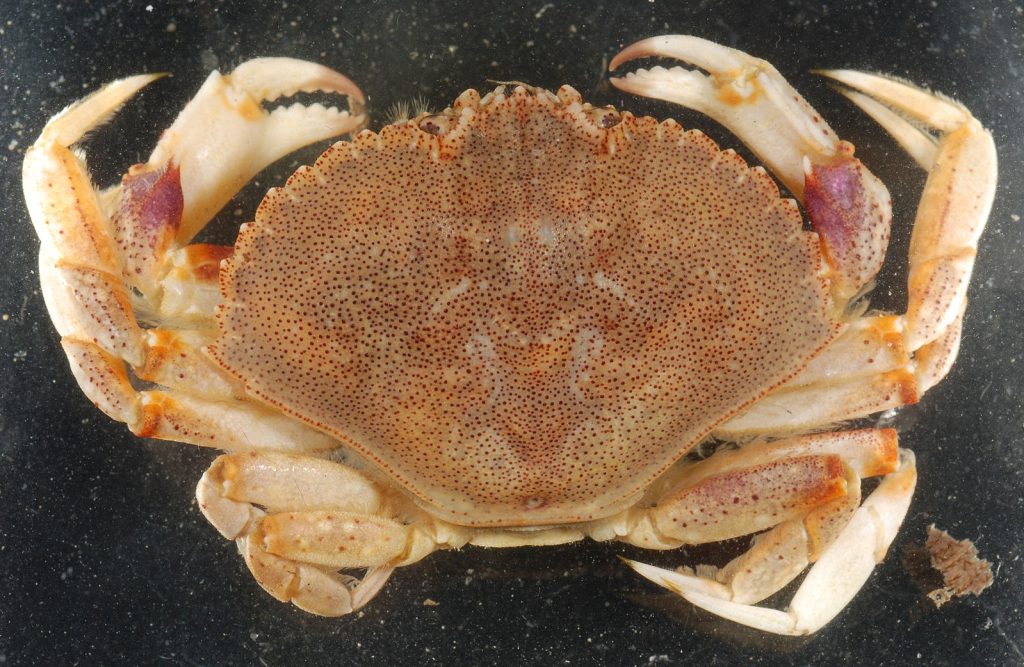Crab

Species Description
Jonah crab Cancer borealis
Rock or peekytoe crab Cancer irroratus
Red crab Chaceon quinquedens
Wild.
“Maine crabmeat” comes from two species, “peekytoe” or rock crab, and Jonah crab. Jonah crabs are a bit larger and reddish with large, black-tipped claws, and are found offshore. The smaller rock crab lives closer to shore, in bays and rivers.
Red crab inhabit deep (1,000-2,000 feet) waters of the continental shelf and slope off the Atlantic coast.
Season
Jonah, rock, and red crabs can be harvested year-round from Maine waters.
Status
A stock status based on 2023 benchmark assessment presented that the coastwide population of Jonah crab remains above historic lows, however, recent declines in landings and catch should be closely monitored. Measures have been implemented to prevent harvest of immature crabs and cap fishery to limit expansion.
Deep-sea red crab and Rock crab are not subject to overfishing, however the status of the stock (biomass, growth, longevity, and abundance trends) is unknown.
Regulatory Authority
Jonah crabs are managed by the Atlantic States Marine Fisheries Commission.
New England Fishery Management Council regulates the deep-sea red crab fishery.
Harvest Method
Crab or lobster pot and dragging. See the vessel and gear guide for more information.
Recreational Harvest
Permitted with a non-commercial lobster and crab license from the Maine Department of Marine Resources (DMR).
Maine state waters:
Jonah crab, Red crab, Rock crab: no minimum size, no bag limit.
Federal waters:
Jonah crab: 4.75 inches carapace width (measured across the widest part of the shell), 50 crabs per person per day.
Red crab: no minimum size, no bag limit.
Rock crab: no minimum size, no bag limit.
A valid federal fishing permit is required for all recreational anglers.
A Maine lobster and crab license is required to harvest commercially.
Health Benefits & Risks
Maine crabmeat is low in fat, high in zinc, and a good source of omega-3 fatty acids.
Crab is low in mercury.
Crab is not usually affected by red tide, but purchase from a certified shellfish dealer or check the DMR hotline for harvesting closures if trapping crabs yourself: 1-800-232-4733 or 207-624-7727.
View the 2021 US Food and Drug Administration’s fish consumption guidelines.
Buying & Preparing
In Maine, crab is typically sold as fresh or frozen picked meat, rather than live. Unless labeled otherwise, most retail crabmeat is a blend of Jonah and rock crab—both local species known for their sweet, delicate flavor.
Look for refrigerated, hand-picked crabmeat at seafood markets and grocery stores. Maine crabmeat is known for being firm, finely textured, and subtly sweet, with a lighter flavor than blue crab. Peekytoe crab (a market name for rock crab) has a slightly firmer and finer texture than Jonah crab.
Crabmeat is ideal for crab cakes, salads, rolls, or light pasta dishes. Because of its mild flavor, it pairs well with lemon, herbs, and light seasonings.
Most red crab harvested in Maine is sold wholesale and typically goes to the restaurant market rather than direct to consumers.
Recipes
Certifications & Verifications
Links
- NOAA Fisheries Species Directory
